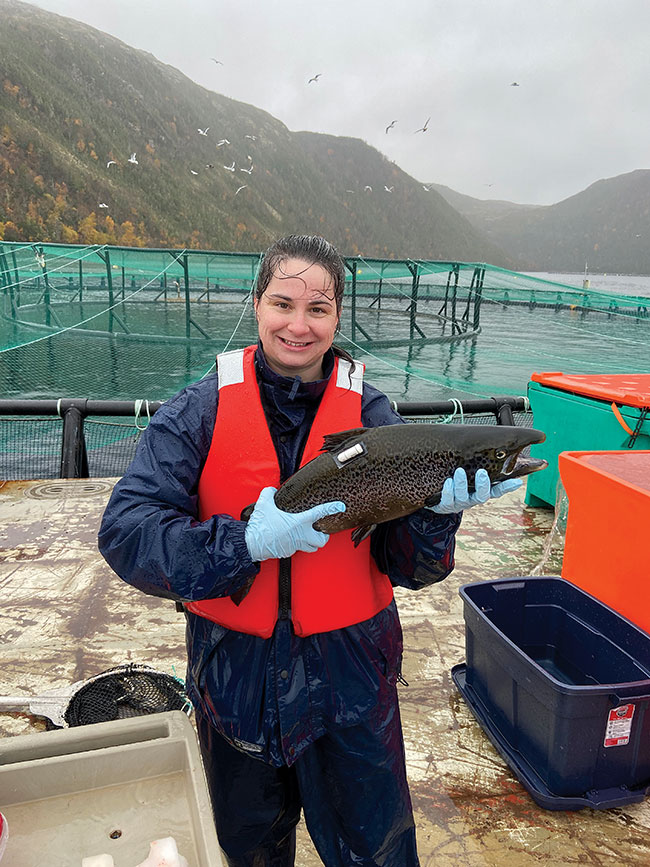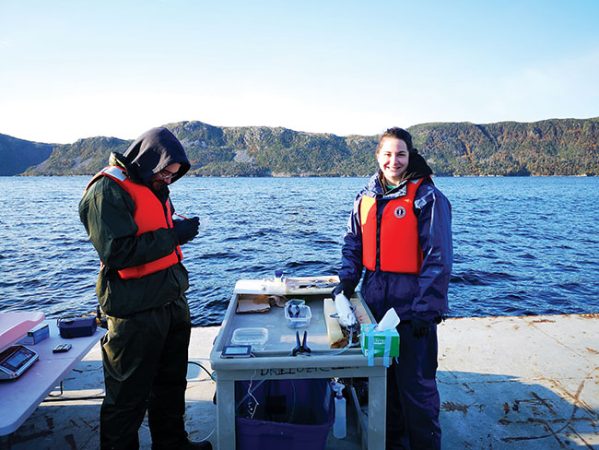
Adapt or die
August 17, 2022
By Ron Hill
Memorial University’s roadmap to fight against climate change impacts
 Rebeccah Sandrelli (M.SC. student) implanting data loggers at a cage-site.
PHOTO: kurt gamperl
Rebeccah Sandrelli (M.SC. student) implanting data loggers at a cage-site.
PHOTO: kurt gamperl Dependent on the environment to provide optimal conditions for fish rearing, the industry is at risk from/at the mercy of climate change. The effects of climate change can, and will, have devastating effects on fish health and the industry if it cannot adapt.
Researchers at Memorial University of Newfoundland and Labrador (MUN) are among the leaders in the fight against the impacts of climate change on net pen farms on the east coast of Canada. The MICCSA program; Mitigating the Impact of Climate-Related Challenges on Salmon Aquaculture, a collaborative initiative between academic researchers and industry, was established in 2016 with the goals of providing a roadmap for adaptation of salmon aquaculture production to climate change, and working collaboratively with Canadian industries to reduce disease-related mortalities and loss of production. With the program winding down after seven years, we spoke with Kurt Gamperl of MUN about the research program and its lasting effects on the salmon industry.
A collaborative effort
Gamperl and Matt Rise of MUN are among the diverse team of scientists leading research under the MICCSA program. The team brings together researchers from some of Canada’s leading universities: Brian Dixon from the University of Waterloo, Mark Fast from the University of Prince Edward Island, Roy Danzmann from the University of Guelph, with leading researchers from private sector research divisions at the Center for Aquaculture Technologies Canada, the Huntsman Marine Sciences Centre, AquaBounty Canada and Somru Bioscience. Each of these primary researchers has a team of scientists, lab technicians and/or students performing research at their own facilities, creating a wide scope of research involving many talented people.
“The research program was designed to be holistic in approach,” said Gamperl. “We are looking at so many levels: at the farm/cage level, organismal level, cellular level (including mitochondrial function), right down to the molecular (genomic and genetic) level. We have been extremely successful identifying challenges under different and changing conditions so we can improve fish production and welfare.”
Beginning research in 2016, the MICCSA program had three goals:
- To determine the lethal and sub-lethal environmental limits of current Atlantic salmon stocks;
- Identify Atlantic salmon families that have enhanced capacity to adapt to environmental challenges and mount robust pathogen-specific immune responses;
- To develop functional and diagnostic assays for assessing fish health and immune function, and the efficacy of vaccine formulations.
Facilities at MUN as research platforms
Research by Gamperl and Rise is being carried out at MUN’s Ocean Science Centre (OSC). The OSC is located in Logy Bay NL and is one of Canada’s leading ocean research facilities. The OSC provides huge opportunities for researchers with multiple specialized facilities onsite.
The Dr. Joe Brown Aquatic Research Building (JBARB) has state-of-the-art facilities for cold-water fish culture, including species such as trout, salmon, lumpfish, wolf fish and halibut.
The Laboratory for Atlantic Salmon and Climate Change Research (LASCCR) is a self-contained facility with 10 x 2.2m3 tanks and 8 x 0.6m3 tanks with full control of photoperiod, temperature, and oxygen levels ideal for physiological studies and immunological challenges.
The Cold-Ocean and Deep-Sea Research Facility houses disease challenge labs and some of MUN’s most sophisticated diagnostic equipment, including confocal and electron microscopes, flow cytometry, deep sea chambers and a full histological lab.
These state-of-the-art facilities have allowed MUN researchers to perform controlled environment research essential to the success of the program.
Results
After seven years of study, the MICCSA program has yielded significant results for the east coast salmon aquaculture community.
“We have made some very important discoveries with the program,” said Gamperl.
Gamperl’s lab alone has produced 12 published papers to this point under the MICCSA program, with more in review and more still being authored.
“The program has provided significant data on how high temperatures (20-23 C) alone, or in combination with other stressors like moderate hypoxia, can impact production, immunology and stress physiology. Several key immune and stress related genomic markers were identified that are responsive to temperature and hypoxia challenges. Researchers also produced antibodies and developed ELISAs (Enzyme-Linked Immunosorbent Assays) for several biomarkers so that their protein levels can be quantified and monitored.”
The hunt for SNPs
One of the key goals of the program is the hunt for SNPs (single nucleotide polymorphisms) that act as chromosomal tags or genetic markers. Finding and identifying SNPs associated with resistance to a pathogen or stressors like high temperature or low oxygen will allow farmers to select broodstock with desired traits using a simple assay. The creation of standardized assays to find these desired SNPs will create diagnostic tools for farmers so they can develop resistance in the genetic line of their stock.
Gamperl reported that “experimentation is complete at this point, but much of the SNP research is still undergoing analysis and evaluation by the researchers. The next phase is a validation study for some of these potential biomarkers. We know the SNPs to look for, now we need to make sure the SNPs are associated with the traits we studied in the initial research.”

Rebeccah Sandrelli implanting data loggers at a cage-site.
PHOTO courtesy of kurt gamperl
Development of data Loggers
“Through research under the MICCSA program, we validated the use of data loggers produced by Star-Oddi (Iceland) as a significant and accurate tool to monitor the physiology and distribution of free-swimming salmonids in a sea cage,” Gamperl noted. These data loggers are inserted into the abdominal cavity of the fish, and have proven their value by simultaneously recording swimming speed, heart rate, body temperature and activity.
“Our success with these data loggers has initiated a new applied research project with industry partners to improve on this technology,” said Gamperl. “The biggest issue with the data loggers is that they must be recovered from the fish.”
Getting the data logger out of the fish means that the fish must be pulled from the cage, scanned to identify the presence of the data logger, which then must be surgically removed before the data can be read.
“We are working to develop an acoustic data logger that will transmit data in real time. An acoustic receiver placed in the cage will collect the data from the data loggers and upload it to an onsite database.”
Expanded research goals and new partners
“We have been very fortunate to extend and expand the MICCSA program and integrate it with other research initiatives at the OSC. Other funding and research partners have come on board to expand on the research being done under the MICCSA program.
The Harris Centre and the Ocean Frontier Institute are two good examples of new partners stepping in to continue valuable research.” These new partners allowed Gamperl and other researchers to expand the scope of their research into other unplanned, but valuable, areas of study related to the effect of climate change on salmon aquaculture.
New climate change research
With their new partners, MICCSA program research has expanded to include new studies that will outlast the MICCSA program. A series of trials to examine if stress phenotype (i.e., cortisol response) or diet play roles in influencing the growth, performance and survival of farmed Atlantic salmon exposed to elevated temperatures have recently been completed.
Methods have been developed to explore mitochondrial traits that may be indicators of high or low thermal tolerance in an attempt to establish measurable links and testable assays. The new tools and assays developed in the MICCSA program, notably the physiological data logger, have facilitated the launch of research into “winter kill”–a phenomenon where salmon moralities increase at low water temperatures in sea-cages. This research involving Cooke Aquaculture, and funded by the Canada Centre for Fisheries Innovation and Industry, Energy and Technology – NL.
Industry partners
“We’ve had tremendous support from our various partners. They have helped us face many challenges, including COVID-19 and obtaining the needed fish stocks. Many of our partners found themselves assisting the program in unintended ways. The program has made some big steps forward for research in this field and has stimulated a lot of other work that cannot happen without industry support,” said Gamperl.
A lasting impact
Applied research develops tools, techniques, as well as significant knowledge. Long term, the research and techniques developed under the MICCSA program will create better fish, health monitoring and fish health assays, which will be essential tools for the industry as it faces changing ocean conditions.
As the results are validated, and tests and assays are commercialized and made available to farmers through test kits or lab services, the ability of farmers to adapt their stocks to meet new conditions will improve.
“Prior to MICCSA there were few tools to evaluate fish health and welfare, and to adapt a stock to changing conditions. What the MICCSA program has done is develop a sophisticated set of tools and tests that can be used by the industry going forward to fight the challenges of climate change.”
Advertisement
- Cooke enters into agreements for acquisition of Tassal
- Viewpoint: Newfoundland is not for the faint of heart





